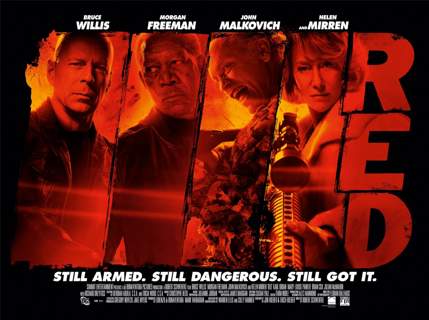Aging, when done properly, does not have to be a chore. While slowing down a bit physically is inevitable, having the benefit of an extra decade or two of life experience can help adjust one’s priorities, focus on the things that truly matter, and enhance appreciation of the finer things in life. It also, as the action movie Red implies, radically increases one’s ability to blow things up and kill bad guys.
Red is an adaptation of a comic by writer Warren Ellis and artist Cully Hammer, and a very loose one. Ellis noted that “the film is very different. Not least because it needed to generate more material than the book itself actually constituted.” The differences extend beyond extrapolation; the comic is rather dramatic in tone, and the movie is, well, a bit more comic.
Bruce Willis, the movie’s lead, has made his career in large part by playing action heroes with a twinkle in their eye and a wisecrack at the ready, although in Red he explores his sweetly awkward, romantically insecure side (which, considering that Willis has probably not had to worry about getting turned down by a girl in over twenty-five years, is a considerable feat of sense memory in acting). Willis plays a retiree who has a shyly flirtatious phone relationship with an unlucky in love Mary-Louise Parker, whose job it is to send him his pension checks.
The opening scenes between Willis and Parker are cute (a not entirely condescending descriptor), but in short order, men in ski masks and machine guns try to kill Bruce Willis—unsuccessfully, of course; cinema’s finest villains have been trying to do so for a very long time, and been utterly futile—and he rushes to protect Mary-Louise Parker, as he quite rightly assumes that the bad guys are going to try to kill her too.
Once mortal peril has been established, the remainder of the story consists of Bruce Willis dragging the (initially) extremely reluctant Mary-Louise Parker around to reconnoiter with a handful of his similarly “Retired and Extremely Dangerous” colleagues, punctuated occasionally by competently executed and flamboyant action scenes wherein bad guys are introduced to the discipline of the machine gun and blown up with bombs.
The former associates are an impressive array of Actors of a Certain Age. Morgan Freeman plays Joe, an amiably lecherous 80-year-old with terminal cancer who is still razor sharp. John Malkovich plays the (justifiably) paranoid Marvin, whose eccentricity may be due to having been dosed daily with LSD for eleven years (which, upon reflection is probably the best explanation for John Malkovich’s idiosyncrasies yet conceived). And, finally, the one and only Helen Mirren as Victoria, the elite assassin of her generation, who is quietly only semi-retired.
Pursuing our heroes are CIA agent Karl Urban—a mere child who can barely even be out of his 30s—who answers to the icy, ruthless Rebecca Pidgeon. Although Urban is a competent agent, he is no match for Bruce Willis (whose above-mentioned supremacy over all adversaries is a fait accompli at this point in his career). Gradually (a little too gradually), events unfold, and the nature of the conspiracy to kill our protagonists and a long list of other people is revealed, leading inexorably to a showdown of grand scale in which many rounds of ammunition are expended, a large number of cars crash into each other, and a satisfactory number of things explode. And the good guys, of course, win.
Red, while neither original nor without flaws, is an agreeably entertaining couple of hours. The action has occasional moments of flair. There is a very colorful sequence involving John Malkovich, a large handgun, and a rocket launcher, and another slick car stunt where Bruce Willis gets out of a car while it’s spinning and empties two clips through the windshield of a pursuing SUV, but the other action set pieces are disappointingly generic. That is, excepting the heavenly sight of Helen Mirren turning several cars into Swiss cheese with a BFG, which is almost worth the price of admission by itself.
Though there is another scene where Mirren fires off several clips with a much smaller machine gun, it is very brief, giving the less easy to please in the audience far too much time to reflect on Jon and Erich Hoeber’s script, which is alternately derivative, stupid, predictable, mildly amusing and a bit scattered. If not for the universally terrific cast (which also includes Ernest Borgnine, Brian Cox, and Richard Dreyfuss), this whole enterprise would collapse.
The chance to watch such an eclectic group of terrific actors (including Bruce Willis, who holds his own in exalted company) having what is, clearly, a massive amount of fun is the greatest draw in Red. The rest of the movie is just inoffensive enough to make Red a fun night at the movies, especially for fans of machine guns and explosions. At the very least, the chance to see Helen Mirren firing several different types of weapons is an experience that no discerning lover of the finer things in life should miss.
Danny Bowes is a playwright, filmmaker and blogger. He is also a contributor to nytheatre.com and Premiere.com.










